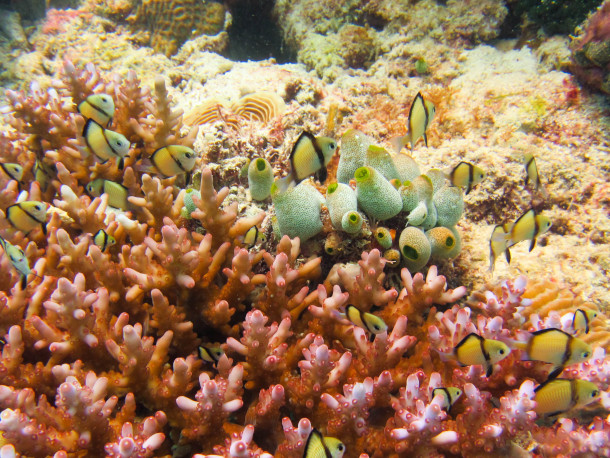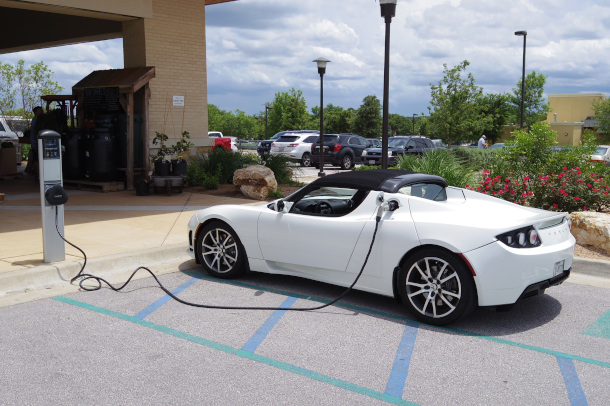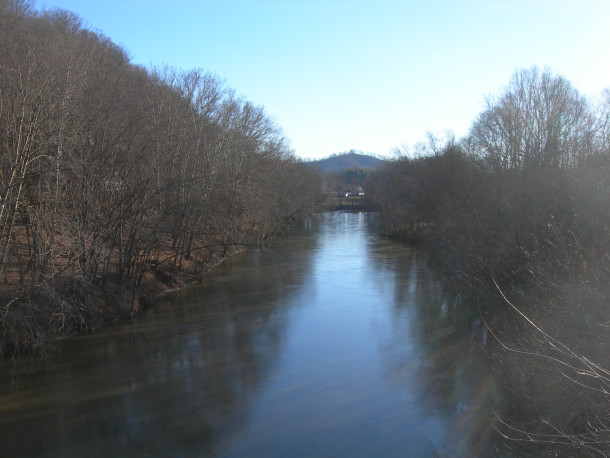Beyond the Headlines
Air Date: Week of October 14, 2022

A new study found that older and more degraded plastics in the ocean can release a higher amount of carbon dioxide, lowering the pH of seawater and harming marine wildlife. (Photo: Eva Funderbugh, Flickr, CC BY-NC 2.0)
This week Beyond the Headlines, Environmental Health News Editor Peter Dykstra and Host Jenni Doering delve into a new study suggesting that the degradation of plastic in oceans can add to acidification. The pair also examine New York’s clean car goal, aiming for all new vehicles in the state to be free of fossil fuels by 2035. Looking to the past, the two recall Massey Energy’s 300-million-gallon coal slurry spill into the Big Sandy River.
Transcript
DOERING: It's time now for a look beyond the headlines with Peter Dykstra. Peter's an editor with Environmental Health News, that's ehn.org and dailyclimate.org. And he joins us from Atlanta, Georgia. Hey, Peter, how you doing this week?
DYKSTRA: Hey, Jenni, I'm doing all right. But I have an item that's a little bit distressing to start because there are two big menaces that we've learned a lot about toward our oceans. One is plastic pollution. The other one is ocean acidification. There's a new study out that says the two are linked, because as plastics slowly break up and degrade in the ocean, they actually contribute to ocean acidification. Oh joy, something else to love about plastics.
DOERING: Yeah oh joy indeed. I mean, there's this problem of ocean acidification partly because we're putting so much CO2 into the atmosphere and they're getting absorbed by the oceans and that actually makes the oceans more acidic. But you're telling me that the plastics themselves when they get into the oceans can also lower the pH?
DYKSTRA: The study was done in a lab environment, not in an open ocean environment. But they think that it would in particularly shallow water, as those plastics over time over years and years begin to break up, the smaller and smaller plastic particles do release acidified material, and that makes the ocean acidification problem worse, particularly near cities and coastlines with shallow water.
DOERING: Yeah, that's certainly no good. What else do you have for us this week, Peter?

In commemoration of National Drive Electric Week, Gov. Kathy Hochul ordered New York environmental officials to issue draft regulations requiring zero-emission vehicles in the state by 2035. (Photo: Zobeid Zuma, Flickr, Public Domain Mark 1.0)
DYKSTRA: Well, New York and California are two states that are always said to have a rivalry. And now New York seems to be following California's lead in calling for an end to the sale of fossil fuel-driven cars and trucks by the year 2035. New York Governor Kathy Hochul has set this as a goal for New York State, which is somewhere around seven or eight percent of the consumer market in the US. California is about 15%. So, what you would have by 2035, if both states follow through on this, is nearly a quarter of the US markets for car and truck sales. And if there's two big states, have other states follow suit, it is going to turn prospects for clean energy cars around in a big hurry.
DOERING: So it's pedal to the metal on EVs.
DYKSTRA: Exactly. I couldn't have said it better myself.
DOERING: Well, going from the cars of the future to history. Peter, what do you have for us this week there?
DYKSTRA: An anniversary from this past week, October 11, 2000. There's a wall of waste reservoir collapsed. It released 300 million gallons of coal slurry into the Big Sandy River in the Commonwealth of Kentucky. The operator of that coal slurry holding pit was Massey Energy. It was fined three and a half million dollars for the spill. There was a huge natural toll for the coal slurry spill. It killed millions of fish and went from the Big Sandy River into the Ohio River, which of course is the source of drinking water in several states and big cities like Cincinnati and Louisville.

On Oct. 11, 2000, a coal slurry reservoir in Kentucky collapsed, releasing slurry and waste into the Big Sandy. (Photo: Jimmy Emerson, DVM, Flickr, CC BY-NC-ND 2.0)
DOERING: Well, thank you Peter. Peter Dykstra is an editor with Environmental Health News, that's ehn.org and dailyclimate.org. And we'll talk to you next week.
DYKSTRA: Alright, Jenni, thanks a lot. Talk to you next week.
DOERING: And there's more on the stories on the Living on Earth website. That's loe.org.
Links
Mongabay | “‘One More Thing’ About Plastics: They Could Be Acidifying The Ocean, Study Says”
AP News | “NY Proceeds With Plan For Zero-Emission Vehicles By 2035”
Learn more about the Coal Slurry disaster in Big Sandy River
Living on Earth wants to hear from you!
Living on Earth
62 Calef Highway, Suite 212
Lee, NH 03861
Telephone: 617-287-4121
E-mail: comments@loe.org
Newsletter [Click here]
Donate to Living on Earth!
Living on Earth is an independent media program and relies entirely on contributions from listeners and institutions supporting public service. Please donate now to preserve an independent environmental voice.
NewsletterLiving on Earth offers a weekly delivery of the show's rundown to your mailbox. Sign up for our newsletter today!
 Sailors For The Sea: Be the change you want to sea.
Sailors For The Sea: Be the change you want to sea.
 The Grantham Foundation for the Protection of the Environment: Committed to protecting and improving the health of the global environment.
The Grantham Foundation for the Protection of the Environment: Committed to protecting and improving the health of the global environment.
 Contribute to Living on Earth and receive, as our gift to you, an archival print of one of Mark Seth Lender's extraordinary wildlife photographs. Follow the link to see Mark's current collection of photographs.
Contribute to Living on Earth and receive, as our gift to you, an archival print of one of Mark Seth Lender's extraordinary wildlife photographs. Follow the link to see Mark's current collection of photographs.
 Buy a signed copy of Mark Seth Lender's book Smeagull the Seagull & support Living on Earth
Buy a signed copy of Mark Seth Lender's book Smeagull the Seagull & support Living on Earth

